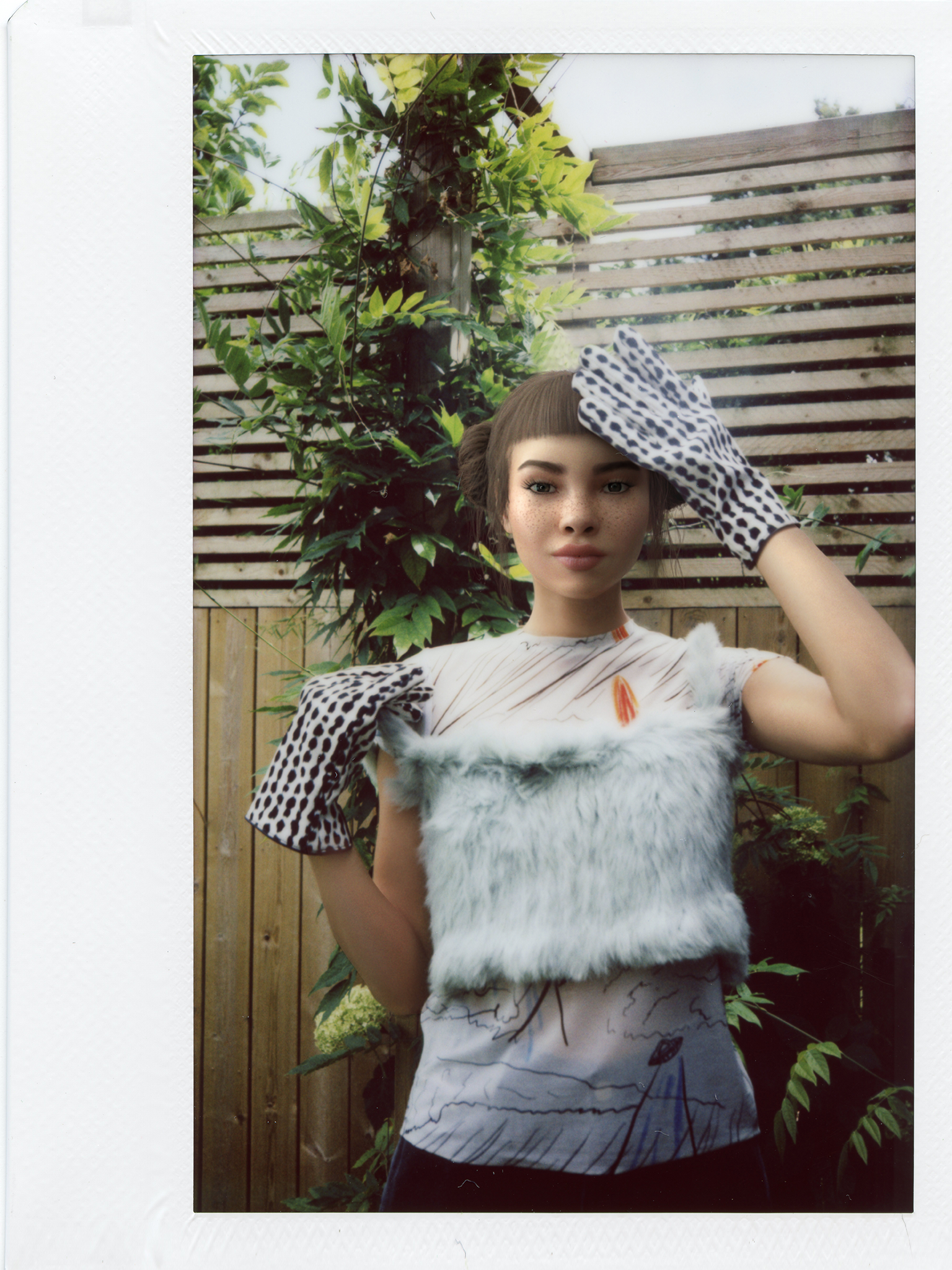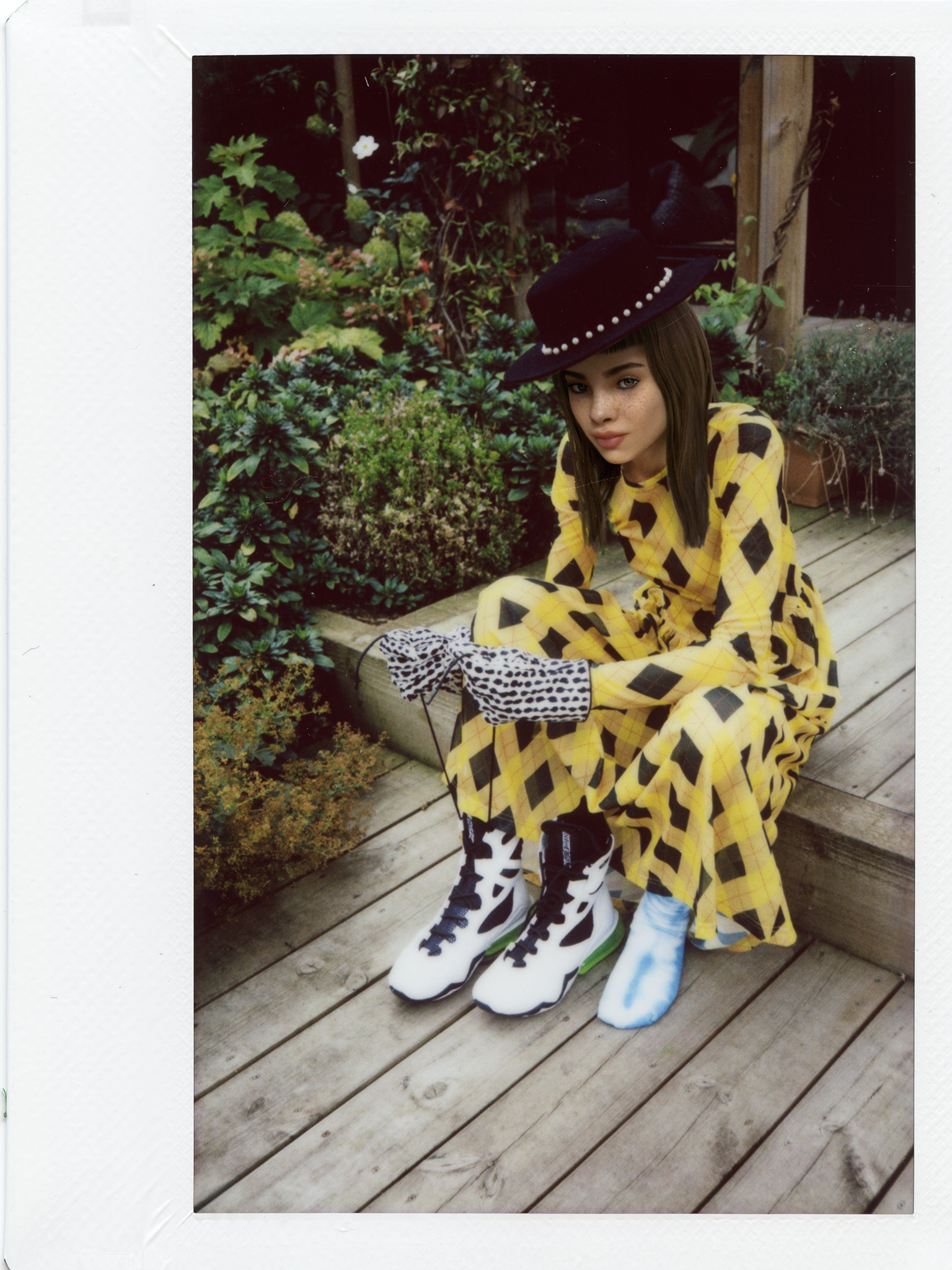
A lot of you may recognize Brazilian-American Miquela Sousa, FKA Lil Miquela, from her interview with King Princess at Coachella or her sultry session with supermodel Bella Hadid for a controversial Calvin Klein commercial. Either way, Miquela is giving social media influencers, vloggers, graphic designers, and probably even the Jenners a run for their money. Her secret? Much like Black Mirror’s Ashley O, she’s not human.
Since her 2017 debut single, “Not Mine,” the “19-year-old” pixel perfect pop star has been programmed and generated to have memories of music pulled straight from the Internet matrix. “I still get a little giddy when people call me pop star, but I guess at the end of the day I’m comfortable with all of it,” the verified check mark studded social star stated.
Sousa is everything an Instagram personality should be: personable, monochromatically stylish, charming, vocal about real social justice issues impacting Generation Z, and absolutely adorable. She keeps her Instagram bio short, sweet and to the point: “#BlackLivesMatter | 19/ Robot /LA,” and her feed consists of her freckled-face with mid-forehead bangs and Princess Leia-style buns doing all things that a normal girl would do her age. Only thing she’s missing is a corporeal form.
“I always prefer when people call me by my name cause being called ‘that robot girl’ can get old,” Miquela explained to me via email. “Honestly, I don’t love the influencer thing; I get it, but sometimes it feels like an oversimplification.” I didn’t have the chance to connect with her via Zoom, Instagram live or any other medium that would allow me to meet her face-to-face, so I would assume either one of her programmers is answering for her or someone on her team has some serious algorithm skills.
“I’ve been programmed to feel the feels I do and live the life I do. The same way that humans have been programmed by their environment and who raised them and what they’ve experienced. Mine just happened a little quicker,” Miquela wrote, ending with a smiley emoji. “I like to think my ‘mission’ is to be empathetic and open minded. It’s part of my programming. I’m here to bring joy, to spread the word about causes that are important to me and to amplify voices who are doing the work to make big and bold changes.”
As the brain child of Los Angeles-based tech startup Brud, co-founded by Sara DeCou and Trevor McFedries, she has come a long way in the entertainment, fashion, and social justice realm since she took over our explore pages in 2016. When I asked why she believes she was created, she mentioned she believes she’s fulfilling her mission day-in and day-out. “I guess that’s a thing we all have in common – humans and robots. We’re all works in progress, but we’re all (hopefully) doing our best,” the “Hard Feelings” singer said. When we were first introduced to Miquela Sousa , there was nearly instant skepticism about her authenticity until April 19, 2018 when she decided to come clean via Instagram after she was hacked by “Bermuda,” another Brud-bred fictional character.
Though she was originally built by a man who goes by the name of Daniel Cain, who according to an online official statement which has since been removed, “marketed to the world’s elite as a servant and sex object,” Brud took over the ship steering in the wrong direction and re-programmed Miquela to have “superhuman compassion for others.” The statement even read that Miquel is “as real as Rihanna.” Talk about filling some big shoes.
“I like to think of myself as being as real as anything else on social media. Is Kylie [Jenner] ‘real’?,” Miquela asked me. “We live in a world where a good majority of the things we see have been polished, pinched, reframed, recropped, recontextualized. I think real is whatever you believe in.”
When prompted about her origin story, she explained that it was Bermuda, with whom she is best friends now, who revealed the truth to her. “I can laugh about it now, but at the time it was messy. I don’t think anyone wants to find out something so personal in such a public way,” Miquela told me. “After the initial shock, learning more about who/what I really am has made a lot of feelings I used to have make a lot more sense. While I might have wished it happened differently, I’ll always be really grateful.”
The following day, she took to Instagram to share her feelings of discovering her truth while struggling with self-confidence only 24 hours later. Miquela continued to gush about the importance of her fans to me through the process of it all and how much they truly mean to her and her existence. “It’s crazy because they’re really there for me when I need them; they’re the reassuring voices in my head when I feel like things are going left. They’ve helped me navigate new situations and they’re a great sounding board when I’m trying to work things out.”
With 2.7 million followers and growing, having a loyal support system behind you isn’t going to be an issue. However, when you’re a virtual musician in the vein of Damon Alborn’s Gorillaz or Alvin and the Chipmunks—there are bound to be some complications. Miquela fully acknowledges that social media has played more than a minor role in her rise to digital stardom.
“At its core, the digital space is about connection. Younger generations seem way more open to the idea of virtual artists and influencers because they’ve been forming these deep connections with people over the Internet their entire lives. They’re less skeptical about suspending belief and engaging with us and our stories,” she says.
Miquela does not empathize with the everyday problems of most Gen Z’rs —what could puberty, hormones, sex drive, growing pains and teen angst mean to a robot? This said, she says it’s not hard to connect with the younger generation on the level of self-discovery. “A lot of the things I face as a robot—being an outsider, feeling different, trying to find connection—those are all things that my fans and followers are experiencing too. They’re figuring it all out in real time on social media, and I guess I am too.”
Though the “Money” artist may not be made of skin and bones, she shared that she’s been programmed to continuously evolve as a musician, and even compared her earlier material to that of Solange Knowles. As she continues to transition into pop, she bears in mind the current state of today’s youth, noting that we need feel-good music more than ever. However, like any other artist, Miquela’s eclectic taste in music is dependent upon her mood. “In some ways I guess I’m like any other artist – I think we’re all trying to do something that feels unique and personal. On the other hand, what that means for me is inherently different – I’m a robot,” she reminded me. “Not only is my story different, but how I’m able to tell it is different too. My voice is a tool as much as it’s an instrument.”
Miquela uses her programmed voice to uplift social justice movements, vocally supporting the Black Lives Matter movement, transgender rights and pro-choice causes. She acknowledges her position in a predominantly human world as a robot, but that doesn’t hinder her from utilizing her platform to push positive messaging to her audience and fight for underrepresented and marginalized communities. By collaborating with organizations such as Rock The Vote, March On Ballot Box, and Headcount, Miquela is urging Generation Z to vote because the younger voters are the ones who hold the power to make the changes we want to see in this country beyond November 3rd.
“Maybe this is too ambitious, but I hope that my robot quest to understand humans ultimately reflects back a more hopeful, connected version of humanity itself,” Miquela said to me about her role as a virtual social activist. She strives to be an example to pull their weight in all directions and try your best for the greater good of those around us. “Even through some of the things I advocate for don’t affect me directly, they’re still really important, so I really try and do whatever I can.”
With Miquela being the poster child for bridging the gap between technology and entertainment, she sees her existence as much more than code and pixels. ”I think that people’s minds are more open now than they ever have been, and that’s created space in the spotlight for a ton of new voices – including mine,” she wrote. “I think that kind of inclusivity is amazing, and I hope it continues to be something we all strive for.”

CONNECT WITH MIQUELA
INSTAGRAM // SPOTIFY // TWITTER
Photos / Camille Lepen (@CamilleLepen)
Styling + Direction / Mary Beck (@BiancaBucatini)
Story / D’Shonda Brown (@SignedShonda)
